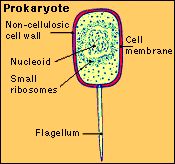Prokaryote

A prokaryote is a cell without a distinct nucleus. Bacteria and some other simple organisms are prokaryotic. The genome of a prokaryote is in the form of a single DNA molecule, like a single chromosome.
Prokaryotes are first found in the fossil record 3,500 million years ago, and are the earliest type of organism. Compare with eukaryotes.
The cell biologist Marc Kirschner discusses the evolutionary history of prokaryotes.
Figure: prokaryotes are simple organisms without a distinct nucleus: the DNA lies naked within the cell.
| Next |



